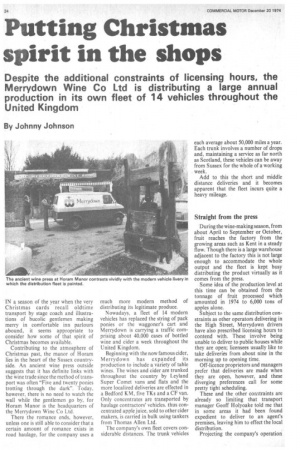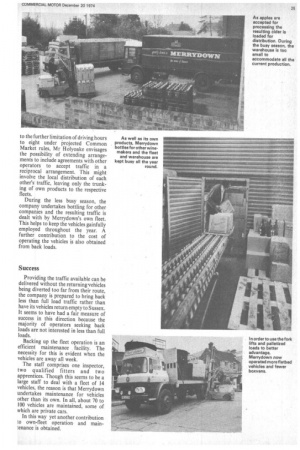Putting Christmas spirit in the shops
Page 26

Page 27

If you've noticed an error in this article please click here to report it so we can fix it.
Despite the additional constraints of licensing hours, the Merrydown Wine Co Ltd is distributing a large annual production in its own fleet of 14 vehicles throughout the United Kingdom
By Johnny Johnson
IN a season of the year when the very Christmas cards recall oldtime transport by stage coach and illustrations of bucolic gentlemen making merry in comfortable inn parlours abound, it seems appropriate to consider how some of that spirit of Christmas becomes available.
Contributing to the atmosphere of Christmas past, the manor of Horam lies in the heart of the Sussex countryside. An ancient wine press outside suggests that it has definite links with the wine trade since the method of transport was often "Five and twenty ponies trotting through the dark". Today, however, there is no need to watch the wall while the gentlemen go by, for Horam Manor is the headquarters of the Merrydown Wine Co Ltd.
There the romance ends, however, unless one is still able to consider that a certain amount of romance exists in road haulage, for the company uses a much more modern method of distributing its legitimate produce.
Nowadays, a fleet of 14 modern vehicles has replaced the string of pack ponies or the waggoner's cart and Merrydown is carrying a traffic comprising about 40,000 cases of bottled wine and cider a week throughout the United Kingdom.
Beginning with the now famous cider, Merrydown has expanded its production to include a variety of table wines. The wines and cider are trunked throughout the country by Leyland Super Comet vans and flats and the more localind deliveries are effected in a Bedford KM, five TKs and a CF van. Only concentrates are transported by haulage contractors' vehicles, thus concentrated apple juice, sold to other cider makers, is carried in bulk using tankers from Thomas Allen Ltd.
The company's own fleet covers considerable distances. The trunk vehicles
each average about 50,000 miles a year. Each trunk involves a number of drops and, maintaining a service as far north as Scotland, these vehicles can be away from Sussex for the whole of a working week.
Add to this the short and middle distance deliveries and it becomes apparent that the fleet incurs quite a heavy mileage.
Straight from the press
During the wine-making season, from about April to September or October, fruit reaches the factory from the growing areas such as Kent in a steady flow. Though there is a large warehouse adjacent to the factory this is not large enough to accommodate the whole output and the fleet is kept busy distributing the product virtually as it comes from the press.
Some idea of the production level at this time can be obtained from the tonnage of fruit processed which amounted in 1974 to 6,000 tons of apples alone.
Subject to the same distribution constraints as other operators delivering in the High Street, Merrydown drivers have also prescribed licensing hours to contend with. These involve being unable to deliver to public houses while they are open; licensees usually like to take deliveries from about nine in the morning up to opening time.
Off-licence proprietors and managers prefer that deliveries are made when they are open, however, and these diverging preferences call for some pretty tight scheduling.
These and the other constraints are already so limiting that transport manager Geoff Holyoake told me that in some areas it had been found expedient to deliver to an agent's premises, leaving him to effect the local distribution.
Projecting the company's operation to the further limitation of driving hours to eight under projected Common Market rules, Mr Holyoake envisages the possibility of extending arrangements to include agreements with other operators to accept traffic in a reciprocal arrangement. This might involve the local distribution of each other's traffic, leaving only the trunking of own products to the respective fleets.
During the less busy season, the company undertakes bottling for other companies and the resulting traffic is dealt with by Merrydown's own fleet. This helps to keep the vehicles gainfully employed throughout the year. A further contribution to the cost of operating the vehicles is also obtained from back loads.
Success Providing the traffic available can be delivered without the returning vehicles being diverted too far from their route, the company is prepared to bring back less than full load traffic rather than have its vehicles return empty to Sussex. It seems to have had a fair measure of success in this direction because the majority of operators seeking back loads are not interested in less than full loads.
Backing up the fleet operation is an efficient maintenance facility. The necessity for this is evident when the vehicles are away all week.
The staff comprises one inspector, two qualified fitters and two apprentices. Though this seems to be a large staff to deal with a fleet of 14 vehicles, the reason is that Merrydown undertakes maintenance for vehicles other than its own. In all, about 70 to 100 vehicles are maintained, some of which are private cars.
In this way yet another contribution to own-fleet operation and maintenance is obtained.




















































































